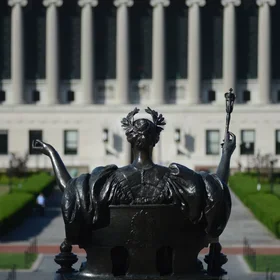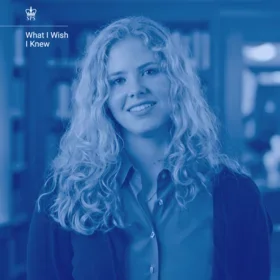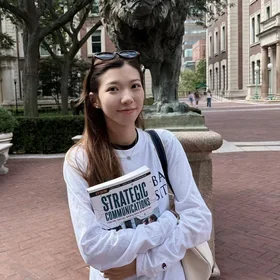By Aishya Elysia, Student in the M.S. in Sustainability Management Program, School of Professional Studies
Benedicto Anggita Prayoga Saragih, commonly known as Baps among his friends, is in his final semester of the M.S. in Sustainability Management (SUMA) program. Last fall, he presented his research at the Indonesian International Sustainability Forum (ISF), focusing on the transformative role of carbon capture, utilization, and storage (CCUS) in Indonesia’s decarbonization journey.
Baps, originally from Indonesia, holds a bachelor’s degree in environmental engineering from the Bandung Institute of Technology. Before enrolling in the SUMA program, he gained experience across sectors—starting as a field engineer with Indonesia’s largest port company and later transitioning into commercial banking at Bank Central Asia (BCA).
What inspired you to pursue the SUMA program, and how did your experiences in Indonesia shape your decision?
My journey toward pursuing this degree began with my work in environmental engineering in Indonesia, where I witnessed firsthand the profound challenges posed by climate change. At Solusi Banjir Indonesia [Indonesia Flood Solution] and Indonesia Port Corporation, I worked on flood mitigation projects, tackling issues like rising sea levels and inadequate urban drainage. While these technical solutions were critical, it quickly became clear that financial constraints were a major barrier to expanding these efforts at scale.
Seeing how the lack of sustainable financing limited the success of these projects made me realize that technical expertise alone wasn’t enough to drive long-term environmental solutions. This realization motivated me to transition into sustainable finance at BCA, where I worked on financing renewable energy projects and learned how capital flows shape sustainability outcomes. However, I soon recognized that commercial banking alone wouldn’t be sufficient to meet the vast financial needs of Indonesia’s sustainability goals. The gap between the available financial resources and the investment required for sustainability projects was enormous, and it was clear that innovative financial models would be necessary to bridge it.
This pivotal experience led me to the Sustainability Management program (SUMA), where I could gain a deeper understanding of the intersection between sustainability and finance. Columbia offers the perfect platform to learn from global experts, build international networks, and refine my skills in sustainable finance mechanisms that can unlock capital for large-scale projects in Indonesia. My ultimate goal is to mobilize resources from both local and global stakeholders and contribute to Indonesia’s transition toward net-zero emissions by 2060.
Can you elaborate on the key findings of your research presented at the Indonesian International Sustainability Forum [ISF] and their potential impact on sustainability practices in Indonesia?
My research, in collaboration with Cecilia Tristavania Dewi, of a leading Indonesian energy firm, examined the role of CCUS in achieving net-zero emissions by 2060. Our analysis highlighted Indonesia’s critical dependence on coal and the need for CCUS to mitigate emissions from this sector. We also noted that the current regulatory framework—Ministry of Energy and Mineral Resources Regulation No. 2 of 2023 and Presidential Regulation No. 14 of 2024—focuses on oil and gas but lacks comprehensive support for broader CCUS implementation, particularly in coal-fired power plants, which are key carbon emitters.
Together, we identified a major gap in financial incentives for CCUS deployment, essential for bringing private sector investment. Drawing from the successful example of the U.S. Inflation Reduction Act 45Q tax credits, which incentivizes carbon capture projects with up to $85 per ton of CO2 captured, we recommended that Indonesia develop similar fiscal mechanisms. These incentives could be a game changer, driving investment not only in the oil and gas sectors but also in coal and heavy industry, sectors crucial for emission reduction and economic growth.
We also emphasized the importance of a robust monitoring, reporting, and verification system to integrate CCUS into Indonesia’s emerging carbon markets, ensuring transparency and accountability. If these recommendations are adopted, Indonesia could lead in sustainable development, achieve net-zero targets, and stimulate economic growth.
How do you see your current studies contributing to your ability to address environmental challenges in Indonesia?
My studies at Columbia University have been humbling and provide me with a solid foundation to tackle Indonesia’s environmental challenges through technical and financial lenses. Courses like Sustainable Finance, Economics for Sustainability, and Financing the Clean Energy Economy have deepened my understanding of developing financial strategies for large-scale projects, such as renewable energy and green infrastructure. This is crucial where financial barriers often impede impactful projects, such as in Indonesia.
A key takeaway has been applying cost-benefit analysis to ensure projects are both environmentally and financially viable. Integrating my technical knowledge from environmental engineering with these new financial insights has significantly broadened my capabilities, making me better equipped to support Indonesia’s journey toward net zero.
Beyond the classroom, I’m eager to expand my network and collaborate with like-minded peers, professors, and industry leaders. Engaging with Columbia’s diverse community has already enriched my perspective, and I hope to leverage these connections to implement sustainable financial models in Indonesia’s energy transition. I’m grateful for the opportunity to contribute to global sustainability efforts alongside such a dynamic group.
How have you adapted to studying abroad and living in a new city?
The academic rigor at Columbia is matched by the personal growth I’ve experienced living in New York City and traveling across the United States. The city’s vibrant energy inspired me to excel academically while also giving me time to unwind and reflect. Whether walking its busy streets or hiking in the serene beauty of other states, these moments added so much richness to my overall experience.
Maintaining a balance between academics and personal wellness has been essential. Columbia’s sports facilities provided the perfect way to stay active amid the demands of my coursework. Taking time for fitness helped me manage stress, stay focused, and maintain a healthy, productive routine throughout the semester.
Whenever I feel homesick, I love going to Awang Kitchen in Queens, my favorite Indonesian restaurant in New York. It’s the perfect spot for an authentic taste of home, with dishes like nasi padang and rendang that instantly bring me back to Indonesia. The comforting atmosphere and rich flavors make it my go-to place whenever I miss home. New York’s incredible culinary diversity also excites me to explore—there’s always something new and delicious to try! It’s definitely one of the best parts about living in this city.
Views and opinions expressed here are those of the authors and do not necessarily reflect the official position of Columbia School of Professional Studies or Columbia University.
About the Program
The Columbia University M.S. in Sustainability Management program, offered by the School of Professional Studies in partnership with the Climate School, provides students with cutting-edge policy and management tools to help public and private organizations and governments address environmental impacts and risks, pollution control, and remediation to achieve sustainability. The program is customized for working professionals and is offered as a full-time and part-time course of study.
The Sustainability Management program fosters creativity and adaptability by equipping students with the skills to tackle real-world sustainability challenges through an interdisciplinary approach from the world’s premier sustainability academics, researchers, and practitioners. The up-to-the-minute curriculum and flexibility prepare graduates for careers in the dynamic and rapidly changing field of sustainability.
Learn more about the program here.


